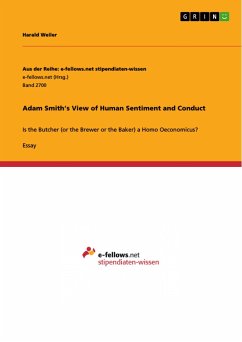
Broschiertes Buch
Is the Butcher (or the Brewer or the Baker) a Homo Oeconomicus?
1. Auflage
9. März 2018
GRIN Verlag
| eBook, PDF | 5,99 € |
Statt 17,95 €**
5,99 €
**Preis der gedruckten Ausgabe (Broschiertes Buch)
inkl. MwSt. und vom Verlag festgesetzt.
Sofort per Download lieferbar
Ähnliche Artikel

15,99 €
Versandfertig in 3-5 Tagen

9,99 €
Sofort lieferbar

14,99 €
Sofort lieferbar

13,99 €**
12,99 €
**Niedrigster Preis der vergangenen 30 Tage
Versandfertig in 3-5 Tagen

9,99 €**
9,49 €
**Niedrigster Preis der vergangenen 30 Tage
Sofort lieferbar

16,99 €
Sofort lieferbar
Ähnlichkeitssuche: Fact®Finder von OMIKRON





